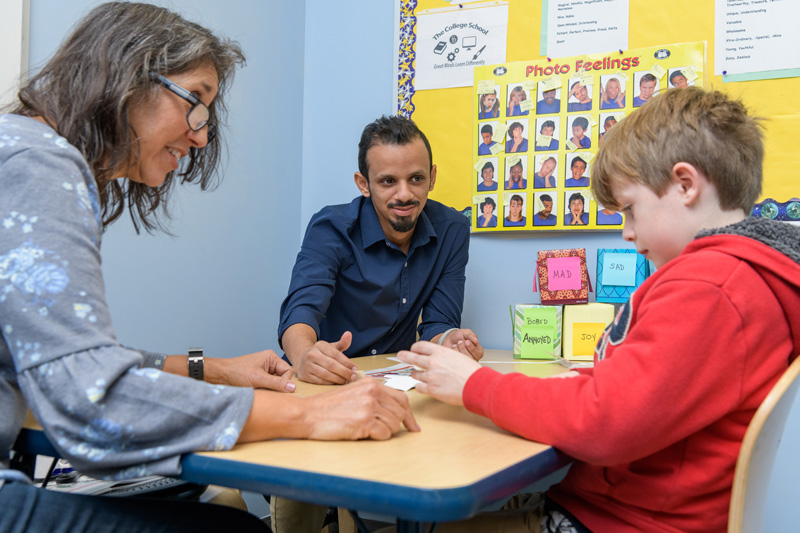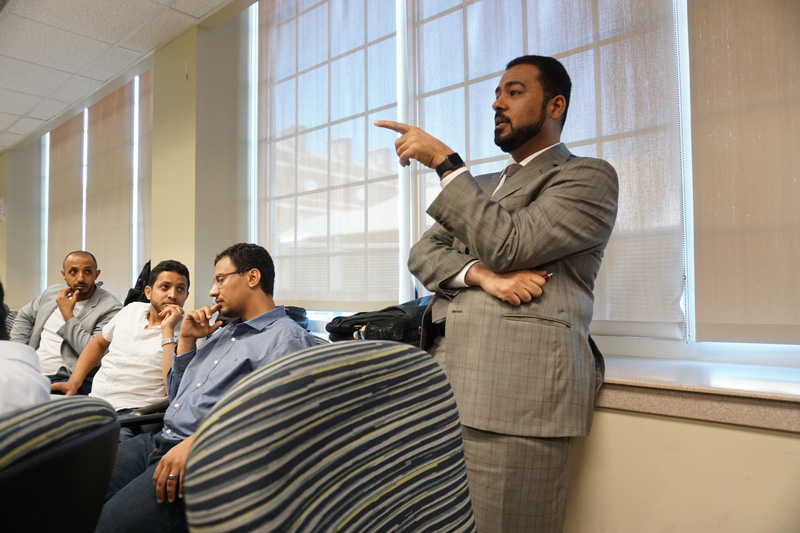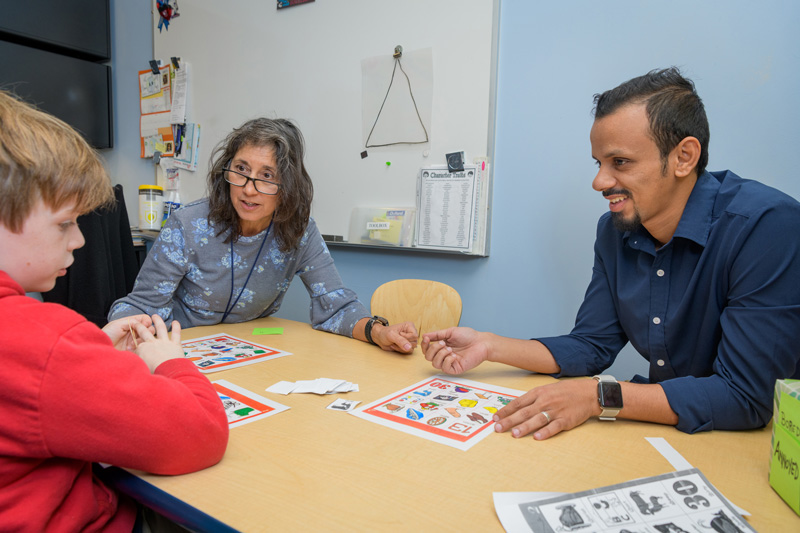


Saudi teachers learning at UD
Photos by Evan Krape and Tabitha Groh January 29, 2019
Many brought families to Newark for yearlong program
When Fawziah Altowairqi was a young girl living in Saudi Arabia, she knew that someday she wanted to visit the United States. Inspired by what she saw on the popular television show, Full House, Altowairqi says that “Coming to America was my dream since I was 12 years old.”
As it turned out, Altowairqi got to fulfill that dream in February 2018, when she came to the University of Delaware for the Khbrat Program, a one-year professional development program for K-12 teachers from Saudi Arabia. Altowairqi is one of 48 teachers attending the program, and like many of her colleagues, Altowairqi brought her family with her. Indeed, when Altowairqi, her husband, and five of their six children arrived at the start of the program, at least by American standards, she brought her own full house to Newark.
Designed for Saudi professional K-12 educators, the Khbrat Program is a collaborative partnership between UD’s English Language Institute and the College of Education and Human Development. Supported and funded by the Saudi Ministry of Education, the program focuses on teacher professional development as part of the ministry’s ambitious education reform initiative, Vision 2030.
The program has involved several stages, including orientation upon the families’ arrival, intensive English classes at the ELI from February through May, and early summer workshops led by both ELI and UD faculty on topics such as best practices in curriculum and instructional approaches. The goal is to prepare the teachers to introduce the information they learn throughout the year to their home schools in Saudi Arabia. Twenty five are English as a Foreign Language teachers and 23 of whom are math, science, computer science, Arabic and special education teachers.
Currently, the Saudi teachers are in the “observation phase” of the project and have been placed with host teachers in five different school districts in northern Delaware. Each teacher is using the time spent in the schools to study an education topic that they can apply in their own classroom.
During her stay, Altowairqi is studying differentiation and looking for new ways to apply it in her classroom. She said the experience has allowed her to gain “something good for my country, for myself, for my students,” but she did not stop there. She also said her children have gained a lot from the experience, and that is a theme reflected through much of the Khbrat Program.
The teachers “can’t fully be engaged in the program if they aren’t supported family-wise,” said Khbrat family liaison Callie Zimmerman, who has been the primary point of contact for the families involved in the program. Zimmerman is part of a UD team composed of faculty advisers, workshop leaders and English language instructors, all guided by academic coordinators Ahlam Musa and Anna Tigan and Khbrat Project director Kate Copeland.

Zimmerman’s role has included anything from assisting with housing to helping families and their children acclimate to the local school system, and she recognizes that the family element is crucial to the success of the program.
“I really want to make sure that [the teachers] feel like they’re supported and they have somewhere to go when they have family or personal issues,” Zimmerman said. When teachers feel supported, “They can focus and do all that they need to do to be successful in the Khbrat Program.”
At the beginning of the program, some of Zimmerman’s work included helping the families with housing and obtaining driver's licenses; the latter being especially noteworthy since, for many of the Saudi women, it was their first time behind the wheel.
Until June of 2018, Saudi women were not legally permitted to drive in their country. Some of the women in the Khbrat Program who chose to drive were doing so ahead of their peers back home; however, Zimmerman explained that there was some hesitancy to get behind the wheel.
“Some of them came and they were going to wait and see if this was something they wanted to do,” she said. But, as the Khbrat members began to see how useful driving is, especially in America, Zimmerman “noticed a large uptick in the number of women who have gotten their licenses.”
In many ways, the new drivers exemplify the spirit of the program, as in Arabic, the word “Khbrat” means “experiences.” Zimmerman said that there have been many notable experiences so far, many times pointing to the experiences of the children.
One of those children was Hisham Alsulaymi, son of Khbrat teacher Mohammed Alsulaymi. Mohammed explained that when Hisham began school in the U.S., he only had three months of prior school experience in Saudi Arabia. And at the start of the U.S. school year, that caused some trouble.
Mohammed said Hisham had trouble adjusting to his school, and it resulted in difficulties with his teachers and peers. Because of these difficulties, Mohammed requested a meeting with Hisham’s teachers. During the meeting, which Zimmerman attended with the family, Mohammed explained that he thought some of his son’s difficulties were due to culture shock. At the end of the meeting, there was a plan in place for Hisham, and it worked.
After a couple months, Mohammed received news from Hisham’s teacher that he had been named Student of the Month. “I met his teacher and she told me that [she] could not believe how [Hisham] had changed in several days,” Mohammed said.
Like Mohammed Alsulaymi, fellow teacher Abdullah Aldeham also had a notable experience with his children during the program, as his wife gave birth to their third child while here in Newark.
“It was a challenging experience,” Aldeham said. A primary challenge was one face by many with a new baby — finding balance. “How can I combine study and taking care of my family?” he asked.
Yet, as Aldeham said, the community helped his family as they adjusted to balancing the rigors of the program with the excitement of an expanding family. “Being surrounded by friends here, either from Khbrat or from other Saudi students, helped us overcome the difficulties,” Aldeham said.
For each family, the decision to come to the U.S. for a year of professional development was not made lightly. Aldeham and Alsulaymi said family was a big consideration in their choice to join the program, and that ultimately their love for teaching and the chance to have new family experiences, respectively, helped them make the decision.
“We decided to join this program because we like to have new experiences and give our kids an opportunity to discover the world,” Alsulaymi said. “Also, we like to try new culture and give our kids this opportunity to learn culture and language.”
In the case of Altowairqi, she said the entire family was excited for the experience, but when they initially arrived, worries about her children divided her attention. When the family first arrived, she said it was a challenge to find an apartment that could accommodate all seven of them, but even after they settled in, as a mother, her worries never left her.
“I think it’s the mom heart. I’m thinking of them all the time,” she said, explaining that it was initially difficult to leave her kids and go to the Khbrat Program each day. Yet, after her oldest son graduated high school in Saudi Arabia, he joined the family in Newark and is now studying at the English Language Institute, and she said he has been a tremendous help with the younger children.
Family and community support throughout the program is important, Zimmerman said.
“They will bend over backward for each other,” she said. “When they have issues happen, they’ll drive each other and just be really supportive.”
On Wednesday, Jan. 30, each of the 48 participants will have a chance to showcase their new expertise and present a plan for how to implement some of their newly gained knowledge and skills through the Khbrat Delaware first annual Capstone Conference, held in the Trabant University Center. Altowairqi’s focus on differentiation is to be part of the conference, and Aldeham expressed excitement about the work he’s done in educational technology.
“I feel that joining the Khbrat program was exactly what I needed to do in order to help fill this gap,” he said, referencing the areas of instruction he would like to bolster in terms of technology.
However, for all three families — either through Altowairqi living out her dream to visit the U.S., Aldeham expressing gratitude for the community support when his child was born or Alsulaymi watching his son find success at school — the experiences they take home will not only be for the schools, but will also be for their families as well.
“We enjoy living here and find it a great experience,” Alsulaymi said. “We will never forget it.”

Contact Us
Have a UDaily story idea?
Contact us at ocm@udel.edu
Members of the press
Contact us at 302-831-NEWS or visit the Media Relations website

